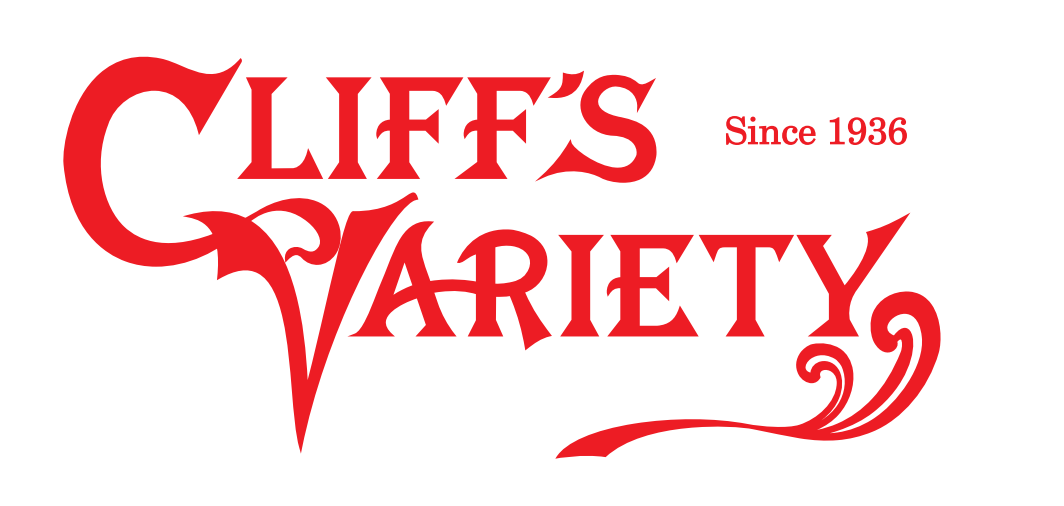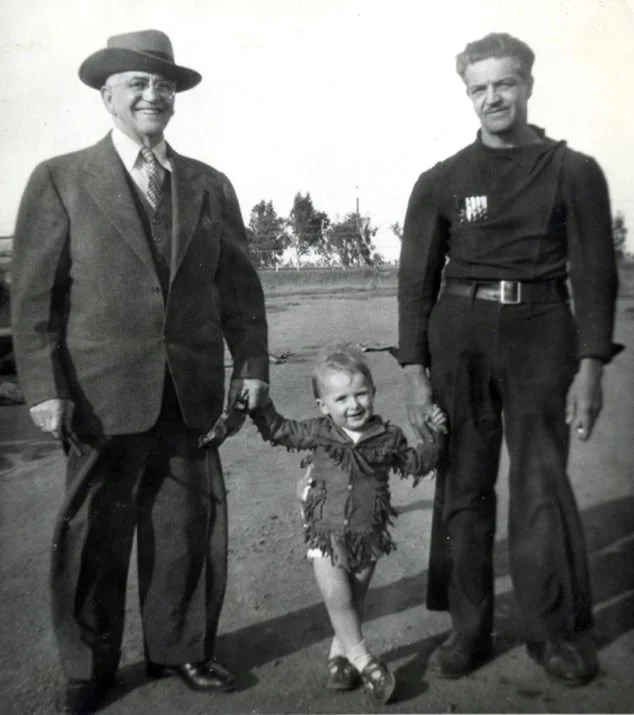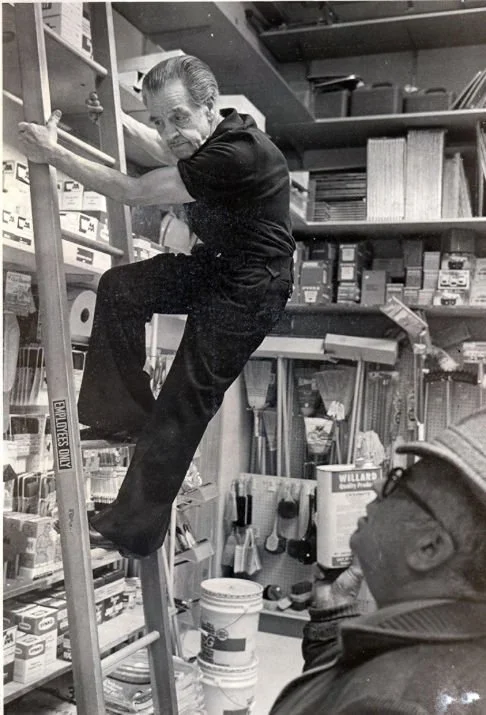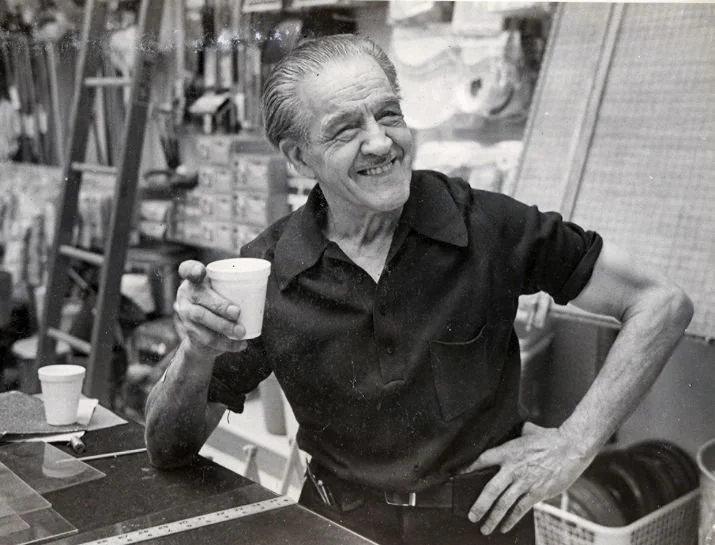Our History
Cliff's Variety Store and Hardware is a hardware, home goods, variety, and fabric store located in the Castro neighborhood of San Francisco, California since 1936. It has been in business for over 75 years and predates the neighborhood, becoming the first widely recognized gay mecca starting in the 1960s. It is one of the oldest family-run stores in the city.
The First Store
The first Cliff’s Variety Store was opened in San Francisco’s Eureka Valley in 1936.
Hilario DeBaca, a former merchant and schoolteacher from New Mexico, came out of retirement to open the business at 545 Castro Street. The shop was mostly a one-man operation with Hilario's granddaughter, Lorraine, helping out after school. Hilario named the store after his youngest son, Clifford. The store sold a variety of goods including magazines, cigars, sewing notions, greeting cards, toys, and candy.
Besides his son Cliff, Hilario and his wife Lena had four other children: Irene, Ernie, Eloy, and Estelle. It would be his oldest son Ernie, not the store's namesake Cliff, who would join in the business with his father. Ernie was born in 1903. From his earliest days Ernie was an entrepreneur. At the age of 14 he operated a horse-drawn popcorn wagon at baseball games in Arizona. At the age of 15 he entered an apprenticeship on the Santa Fe Railroad to be a boilermaker. In the early 1920's he worked on steam locomotives at the Santa Fe yard in Richmond, California. Ernie DeBaca went on to start a taxi service in San Rafael with four limousines. In 1921 he married Alice and later they moved to San Francisco, where he bell-hopped at the Wiltshire Hotel (now the Drake near Union Square). At this time he also formed a dance band called the Spanish Don's with his brother Cliff on tenor saxophone. Ernie played banjo in the five-piece band.
In the 1930's Ernie DeBaca operated Ernie's Repair Shop in San Francisco's Tenderloin. His business offered radio sales and service, lock repair, electrical and plumbing repair, welding, sheet metal work, and mechanical repairs. In 1933, in the midst of the Depression, Ernie and Alice bought a used Studebaker President, which they converted into a motor home. They closed the repair shop and with their daughter Lorraine they headed for The Chicago World's Fair. Ernie loaded the caravan with radio parts and in every town they stopped in along the way he would ask if anyone needed a radio fixed. In some of the small towns people brought him radios that hadn't worked in years.
After seeing the fair and a good slice of the country Ernie and his family landed in Los Angeles and without missing a beat he started up a small candy factory. A little while later they returned to San Francisco to open another repair shop. This was about the same time Ernie's father was opening Cliff's.
The Second Store
In 1942 Hilario DeBaca moved his store a few doors closer to 18th Street to 515 Castro. This shop, though still quite small, had double the space of the first Cliff's. In 1946 Ernie DeBaca had a motorcycle accident that crushed his ankle. He was laid up for several months recuperating. He had to close his repair shop and he set up a workbench in the back of Cliff's Variety where he could repair small appliances.
On Halloween in 1946 Ernie produced the first Halloween street party on Castro Street. It started very small as a children's costume contest. The first year a stool served as a stage. Each child would stand on the stool and the crowd would applaud. The child with the loudest applause won. The tradition grew over the years with a flatbed truck serving as a stage with lights and a P.A. system. In addition to the costume contest there were musicians, clowns, jugglers and other types of entertainment; and there was an ice cream eating contest and a parade. This tradition of a children's Halloween party continued through the 50's, 60's, and 70's. It came to a sad end in 1979 when instead of hosting hundreds of local children Castro Street had crowds of tens of thousands of rowdy adults fighting and breaking windows. Ernie DeBaca realized that his Halloween tradition had ended.
Cliff's at 515 Castro became the birthplace of many of Ernie DeBaca's innovations in merchandising. To take advantage of the only space left in the store, the ceiling, he created a candy machine that consisted of metal trays full of candy bars. The trays were suspended between two loops of bicycle chain, which ran in tracks. The customer could throw a switch to start a motor to move the chain. The trays at counter level would rise up to the ceiling as the higher trays descended to the customer's reach. This allowed a large selection of candy to be displayed in a small counter space. Later he built a similar device for spools of sewing ribbon (this machine is still operational and can be seen in the Sewing Department of our Annex). More machines followed: two machines for sewing buttons which took cards of buttons for a ride up to the ceiling and the length of the store and back, and similar machines for key blanks, greeting cards, and fabric dyes.
The business grew at this location until the property owner, The Hibernia Bank, decided to demolish the building to provide the bank with a drive-through teller window. Ernie was fond of joking, "They tore the building down so we decided to move." (Drive-through banking was a short-lived phenomenon. A new building with a Sun Glasses Hut now occupies that space.)
In 1947 Ernie and Alice DeBaca's daughter, Lorraine had a son and named him Ernie. In 1952 Hilario DeBaca died.
The Third Store
In May of 1960 Cliff's Variety Store opened in its third location, 495 Castro Street. Three of the space-saving machines were set up in the new space: the ribbon machine and two button machines. Ernie was a native genius and was able to fix almost anything. People brought in nearly everything to be repaired: televisions, radios, toasters, lamps, locks, clocks, windows, and the kitchen sink.
Alice DeBaca, Ernie's wife, worked the store and took care of their grandson, Ernie Asten. In 1963 she suffered a stroke. It took more than a year for her to recover to the point where she could visit the store in her wheelchair and later with her walker. Ernie and Alice's daughter, Lorraine, returned to help run the store in Alice's absence. However, Lorraine's husband was in the Navy stationed on the East Coast, and she needed to be with him. Ernie Asten was by this time old enough to help out at the store after school. He would mind the store while his grandfather went home for dinner, but more help was necessary and a few other employees were hired. One of these was Lena Sozzi, who worked for Cliff's from 1964 until her death in May of 1989. Martha Sullivan, Ernie Asten's girlfriend, started helping out at Halloween and Christmas. In the summer of 1968 Martha started full time. Ernie and Martha married in 1969 and they have been at Cliff's ever since.
The Eureka Valley was a sleepy neighborhood in the early 1960's, then the Haight-Ashbury "happened" and San Francisco had an incredible influx of people. When the apartments in the Haight filled up, some of the overflow came to Eureka Valley. The weather was nice and the flats were spacious and cheap, so groups of "hippies" moved in. After the Summer of Love many of the hippies drifted away to communes in Oregon and other destinations. By the mid-sixties there were already a few gay owned businesses on Castro Street: a gift shop, a record store, and an antique shop; and there was a bar, The Missouri Mule, on Market Street. Gay men and lesbians were becoming more visible on Castro Street. Gays started buying the old houses recognizing the potential of these neglected Victorians. As the property values rose families were selling and moving to the suburbs. As gays moved in gay bars replaced the straight bars and the sleepy neighborhood took on a new and different life. Other businesses in the area were changing. Property values were rising and it was inevitable that commercial rents would increase.
In early 1971 the landlord of 495 Castro Street told Ernie DeBaca that his rent would triple when his lease expired later that year. Fortune smiled on Ernie and Cliff's when the Bon Omi store (a five and dime) went out of business. The day it closed Ernie made an offer on the building and purchased 479 Castro Street in August of 1971.
The Fourth Store
In September of 1971 Alice DeBaca passed away. She had been working along with Ernie, her husband of 49 years, to get the store moved, but she never got to see it open in the new location.
In October of 1971 Cliff's opened at 479 Castro Street. The building was erected in 1910 as The Castro Theater, it was remodeled into a retail store in the mid 1920's after the larger Castro Theater was built. This store was much larger than the previous one, and it seemed that it would be impossible to fill the place up. The merchandise was spread out to make the store look full, however, it was not long before the shelves started going higher up the walls. Ernie Asten, who had grown up at his grandfather's side, had learned many skills. It was his idea to add the rolling ladders. As new counters were needed he found it easier to build them himself than to find just what was needed to fill a particular spot. Product lines were added and expanded to meet the needs of people restoring their Victorians, and lines were also added to accommodate people putting their drag costumes together. So, you could get a plaster ceiling medallion, a feather boa, a toilet fill valve, a rhinestone tiara, and toys for the nieces and nephews all in one place!
There were rapid changes in the neighborhood during the 70's. As the gay population exploded the street was constantly bustling with people. In 1971 Cliff's had 3 employees who were not family. As the business grew the number of workers increased to 36. Cliff's was the first straight-owned business on the block to hire openly gay employees. As the neighborhood changed so did the skills required of sales clerks. In addition to a knowledge of hardware, electrical, and plumbing, people were needed who could advise with decorating, costuming, cooking, sewing and entertaining.
Ernie DeBaca had a long tradition of elaborate window displays, especially at Halloween and Christmas. As new people were hired they were encouraged to share their talents and creativity. Over the years Jay Jebens, Paul Ellis, Larry Bair, A.J. Powell, Erik Morales, and many others have contributed to the innovative window displays that the customers have come to love.
The 70's not only witnessed the expansion of the business it also saw the birth of Ernie and Martha's two daughters. After growing up in the city, the youngest daughter Marian decides to forgo city life as an adult and moves north for a life in the country. The older daughter, Terry spends her high school years working at the store in the family tradition before going away to college.
The Annex
The 80's were a time of rapid growth for Cliff's. The property value in the neighborhood experienced a steady climb as gay people the world over flocked to live in the new gay Mecca. As the energy in the neighborhood increased so to did the business at Cliff's. It became a neighborhood hub where old friends would meet and new friends were made.
As the business flourished so did the need for more space. Even though a decade earlier an entire basement had been excavated beneath the floor of the store Cliff's was still quickly running out of room. The counters grew taller and more creative ways were devised to display and store the ever-growing number of items needed to satisfy the growing demands of the neighborhood.
It was in the late 80's that relief would come to an overloaded Cliff's Variety. The store adjacent to Cliff's, a Hallmark Card shop (formerly Work Wonders, a furniture store, and before that Square Deal Paints), became available to lease. Ernie and Martha quickly jumped at the opportunity and it was decided the space would become the new home of Cliff's fabric and linens as well as bedding and bath accessories.
The store would go through many changes during the early 90's and it would be the dot com boom of the late 90's that would shape the product selection that is Cliff's Annex today. The rapid influx of money into the city and a mantra of "money is no object" allowed Cliff's to break away from it's 5 & 10 reputation and move into the world of upscale marketing.
It was in the height of this boom that another opportunity for expansion would arise. After many years trying to convince the building owner to sell she finally conceded by moving toward the light and Cliff's quickly bought the property.
This created many possibilities for the future growth of a booming business. Plans were soon devised to remodel the existing structure creating more floor space as well as desperately needed storage. Cliff's today is a larger structure comprised of the two stores combined creating a larger overall retail space while maintaining the better-best offering our customers have grown to expect.
The late 90's also saw the return from college of Terry, Martha and Ernie's eldest daughter. It was during this period of growth that Terry chose to carry on the family tradition and began her rite of passage to becoming the latest generation to take over operations of Cliff's Variety. In 2003 Terry herself had a daughter who is growing up in her grandfathers footsteps and may one day be the next generation to carry on the history of one of the oldest family owned stores in San Francisco.







